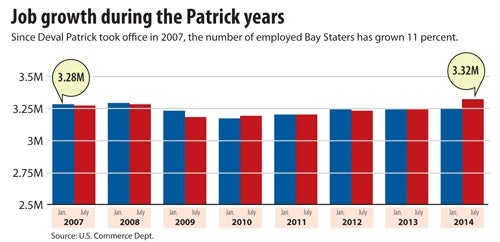Business issues will not go unnoticed over the next seven weeks as Massachusetts voters prepare to elect a new governor and decide the fates of four ballot questions, each of them tied to the Bay State economy.
To be sure, the major-party nominees for governor — Republican Charles Baker and Democrat Martha Coakley — and the three independent candidates on the ballot: Evan Falchuk, Jeff McCormick and Scott Lively will rally around the issues they and their handlers believe will matter most to voters. But to the business crowd, the issues are pretty clear, and where the candidates come down on them will dictate who gets the business vote.
There are several business-related issues that deserve to be front and center. Clearly, the successor to Deval Patrick is expected to continue the Bay State’s post-recession recovery, and how Baker and Coakley approach these five issues will be key:
ECONOMIC GROWTH
How will the state continue to grow jobs, especially in industries such as life sciences and clean energy, where Massachusetts has emerged as a leader? Since Patrick was inaugurated in 2007, the number of employed Bay State residents has risen 11 percent, despite the fact that the Great Recession caused a loss of about 111,000 jobs by the end of 2009. All those lost jobs came back as of last March and the job gains have kept on coming since.
FOSTERING BETTER EDUCATION, MORE INNOVATION
Unlike states such as Florida with its tourism industry, or the energy industry in Texas, Massachusetts’ strongest economic assets are human capital and the colleges and universities that generate it. Education is not just a grassroots issue; it’s critical to the state’s economic future. How do we make our schools more affordable? How do we better align educational efforts with the current and future needs of industry? We’re fast approaching a time when companies looking to hire won’t find enough qualified, properly trained employees. Does either candidate offer a credible plan to prevent that?
STREAMLINING PERMITTING
Many communities have either begun or are examining ways to streamline permitting to help accelerate business development and add to their tax bases. Will either candidate try to further nudge cities and towns in that direction through incentives? Managing such an issue can be akin to herding cats, but who can best move it ahead?
TAXATION
Baker wants to phase out the inventory tax, which is a good idea. If you make products and your markets dry up, leaving your business with a lot of product on your shelves, why should that be a penalty, especially in manufacturing, where both Baker and Coakley want to see growth? Then, there’s the state income tax, which was lowered by voter referendum to 5 percent several years ago. But that mandate was ignored by the legislature. And the sales tax? Patrick had a good idea in 2013 to lower it to less than 5 percent (although coupled with an income tax increase), but that never gained traction.
OUR ENERGY FUTURE
During his second term, Patrick looked for ways to reduce the state’s dependence on fossil fuels and invest in more renewable forms of energy. There are plans to expand the distribution of natural gas, and a reduced reliance on nuclear energy will switch more of the focus to alternative sources. Capping or reducing energy costs can help a resurging manufacturing industry, which is especially important here in Central Massachusetts. Who has an energy plan that makes sense for the environment, but that also aims to control or reduce costs to commercial users?
The candidates have a responsibility to lay out where they stand on these key issues. We hope each takes a balanced, but business-friendly, pro-growth stance. That way, we’ll have a clearer picture of what we’ll get after the victor takes the oath of office.

